General Nonfiction
- You are here:
- HOME
- Books Management
- General Nonfiction

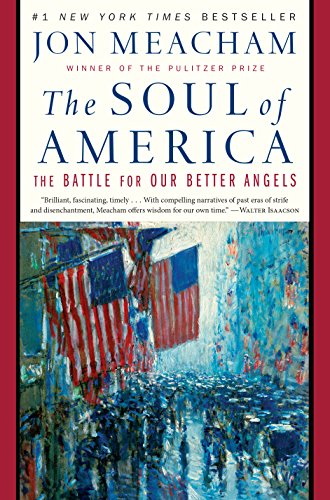
#1 NEW YORK TIMES BESTSELLER • Pulitzer Prize–winning author Jon Meacham helps us understand the present moment in American politics and life by looking back at critical times in our history when hope overcame division and fear.
Our current climate of partisan fury is not new, and in The Soul of America Meacham shows us how what Abraham Lincoln called the “better angels of our nature” have repeatedly won the day. Painting surprising portraits of Lincoln and other presidents, including Ulysses S. Grant, Theodore Roosevelt, Woodrow Wilson, Franklin D. Roosevelt, Harry S. Truman, Dwight Eisenhower, and Lyndon B. Johnson, and illuminating the courage of such influential citizen activists as Martin Luther King, Jr., early suffragettes Alice Paul and Carrie Chapman Catt, civil rights pioneers Rosa Parks and John Lewis, First Lady Eleanor Roosevelt, and Army-McCarthy hearings lawyer Joseph N. Welch, Meacham brings vividly to life turning points in American history. He writes about the Civil War, Reconstruction, and the birth of the Lost Cause; the backlash against immigrants in the First World War and the resurgence of the Ku Klux Klan in the 1920s; the fight for women’s rights; the demagoguery of Huey Long and Father Coughlin and the isolationist work of America First in the years before World War II; the anti-Communist witch-hunts led by Senator Joseph McCarthy; and Lyndon Johnson’s crusade against Jim Crow. Each of these dramatic hours in our national life have been shaped by the contest to lead the country to look forward rather than back, to assert hope over fear—a struggle that continues even now.
While the American story has not always—or even often—been heroic, we have been sustained by a belief in progress even in the gloomiest of times. In this inspiring book, Meacham reassures us, “The good news is that we have come through such darkness before”—as, time and again, Lincoln’s better angels have found a way to prevail.
Praise for The Soul of America
“Appalled by the ascendancy of Donald J. Trump, and shaken by the deadly white nationalist rallies in Charlottesville in 2017, Meacham returns to other moments in our history when fear and division seemed rampant. He wants to remind us that the current political turmoil is not unprecedented, that as a nation we have survived times worse than this. . . . Meacham tries to summon the better angels by looking back at when America truly has been great. He is effective as ever at writing history for a broad readership.”—The New York Times Book Review
“This is a brilliant, fascinating, timely, and above all profoundly important book.”—Walter Isaacson
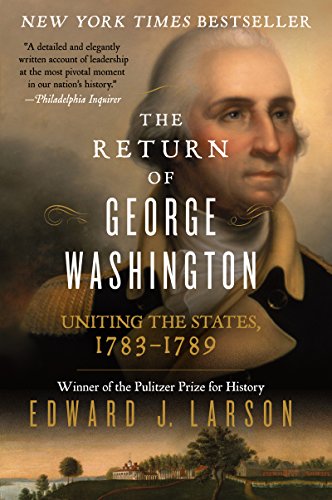
NEW YORK TIMES BESTSELLER
"An elegantly written account of leadership at the most pivotal moment in American history" (Philadelphia Inquirer): Pulitzer Prize-winning historian Edward J. Larson reveals how George Washington saved the United States by coming out of retirement to lead the Constitutional Convention and serve as our first president.
After leading the Continental Army to victory in the Revolutionary War, George Washington shocked the world: he retired. In December 1783, General Washington, the most powerful man in the country, stepped down as Commander in Chief and returned to private life at Mount Vernon. Yet as Washington contentedly grew his estate, the fledgling American experiment floundered. Under the Articles of Confederation, the weak central government was unable to raise revenue to pay its debts or reach a consensus on national policy. The states bickered and grew apart. When a Constitutional Convention was established to address these problems, its chances of success were slim. Jefferson, Madison, and the other Founding Fathers realized that only one man could unite the fractious states: George Washington. Reluctant, but duty-bound, Washington rode to Philadelphia in the summer of 1787 to preside over the Convention.
Although Washington is often overlooked in most accounts of the period, this masterful new history from Pulitzer Prize-winner Edward J. Larson brilliantly uncovers Washington’s vital role in shaping the Convention—and shows how it was only with Washington’s support and his willingness to serve as President that the states were brought together and ratified the Constitution, thereby saving the country.
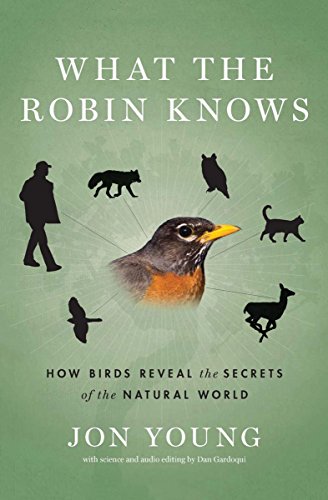
A guide to listening to songbirds—the key to observing nature in a whole new way. Includes audio of bird vocalizations!
A lifelong birder, tracker, and naturalist, Jon Young is guided in his work and teaching by three basic premises: the robin, junco, and other songbirds know everything important about their environment, be it backyard or forest; by tuning in to their vocalizations and behavior, we can acquire much of this wisdom for our own pleasure and benefit; and the birds’ companion calls and warning alarms are just as important as their songs.
Birds are the sentries of—and our key to understanding the world beyond our front door. By learning to remain quiet and avoid disturbing the environment, we can heed the birds and acquire an amazing new level of awareness. We are welcome in their habitat. The birds don’t fly away. The larger animals don’t race off. No longer hapless intruders, we now find, see, and engage the deer, the fox, the red-shouldered hawk—even the elusive, whispering wren.
Deep bird language is an ancient discipline, perfected by Native peoples the world over. Finally, science is catching up. This groundbreaking book unites the indigenous knowledge, the latest research, and the author’s own experience of four decades in the field to lead us toward a deeper connection to the animals and, in the end, ourselves.
“He can sit still in his yard, watching and listening for the moment when robins and other birds no longer perceive him as a threat. Then he can begin to hear what the birds say to each other, warning about nearby hawks, cats, or competitors. Young’s book will teach you how you, too, can understand birds and their fascinating behaviors.” —BirdWatching
“Here is the ancestral wisdom passed down from Apache elder Stalking Wolf to renowned tracker Tom Brown to Jon Young himself, who in turn passes on to the reader the art of truly listening to the avian soundscape. With all senses more finely tuned, you’ll find yourself more aware of your surroundings, slowing down, and reconnecting with a native intelligence and love of the natural world that lies deep within each of us.” —Donald Kroodsma, author ofThe Singing Life of Birds and Birdsong by the Seasons

Imagine getting up and running with the ketogenic diet in the next 15 minutes.
Imagine cooking amazing, mouth-watering recipes that are quick and easy to make.
I wrote this guide to be simple, easy to understand, and ACTIONABLE - especially with beginners in mind.
I reveal the secrets to get you started on the ketogenic diet fast.
I even include over 50 easy to follow ketogenic diet recipes.
Here's exactly what you'll discover in this ketogenic diet cookbook:
Perfect for both beginners and experienced ketogenic dieters, this concise, actionable guide is literally a "crash course" on the ketogenic diet.
So scroll up and get this ketogenic diet recipe book now!

It’s a regular day, but for some reason, you can see this coming. Your girlfriend has sent you a text message that reads “we need to talk” and you are almost expecting this to be another request for you to change certain things about the relationship, but it turns out she wants to break up.
Before I go on, trust me when I say that I know what you are going through right now. The pain you are experiencing feels worse than any physical pain you could ever imagine. I’m sure this happened recently and you are looking to find a way to get your girlfriend back. You are consumed with questions regarding what she is doing. You wonder who she’s hanging out with and you are desperate to contact her and let her know you want to get back together.
STOP right there! Let me start this by saying that you are NEVER going to get your girl back if you contact her now. If you do this now, your chances of having her back in your life are slim to none, and your chances of her wanting a romantic relationship again are zero. Yes, a big fat zero. I’m not saying this to make you feel even more depressed and desperate. I’m saying this because I have the answer to your problems.
I was there in that exact same position you are. I was wet behind the ears when it comes to the art of getting someone to want me again. I tried the flowers. I tried the crying for her to feel bad for me. I tried the social media stalking. It all backfired on me big time. Every single time I wanted a girl back after she had broken up with me, I was only successful at pushing her further away.
Women have brains that work entirely different from what we think. When they love you, they can’t get enough of you all day long, but when they make up their mind about leaving you, they want you gone for real. Lucky for you, this is exactly what you are going to use to get her back. It sounds crazy, but the no contact rule is a scientific fact. The problem is that most guys have no idea how to do this and they fall into temptation.
This will be your guide on this incredible journey to becoming the ultimate desirable guy. You will get your girlfriend to call you by the time you are done with this book and I guarantee it will be out of the need to hear from you. You will make her feel more attracted to you than she ever did even before she decided to leave you.
It’s going to be a very difficult road at first, but nothing good ever came out of easy challenges. I promise you that by the time you finish reading the book, you will be a completely new man and you will be the one deciding if you want to get back together with your EX!
So why wait? Get your copy now!
DISCLAIMER: This eBook is not for women trying to get their ex-boyfriends back. Strictly FOR MEN ONLY.
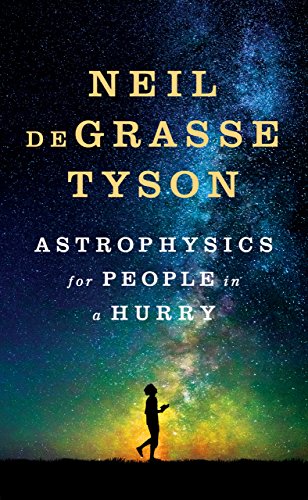
The essential universe, from our most celebrated and beloved astrophysicist.
What is the nature of space and time? How do we fit within the universe? How does the universe fit within us? There’s no better guide through these mind-expanding questions than acclaimed astrophysicist and best-selling author Neil deGrasse Tyson.
But today, few of us have time to contemplate the cosmos. So Tyson brings the universe down to Earth succinctly and clearly, with sparkling wit, in tasty chapters consumable anytime and anywhere in your busy day.
While you wait for your morning coffee to brew, for the bus, the train, or a plane to arrive, Astrophysics for People in a Hurry will reveal just what you need to be fluent and ready for the next cosmic headlines: from the Big Bang to black holes, from quarks to quantum mechanics, and from the search for planets to the search for life in the universe.

Write an Amazon Kindle Bestseller in the next 30 Days!
Sound to good to be true?
Well, with the right strategy and proper research before you start, it is absolutely possible, even if:
- you are not a writer
- have no marketing experience
- don’t have a large following yet
As a 9-time #1 Bestselling & Top 100 Business Author, Gundi knows a thing or two about writing & publishing bestsellers.
All her books reached #1 within just a few days of publishing and over time, she developed a
that can help you reach Bestseller status with your very first book.
"Kindle Bestseller Publishing" is part 5 of the “The Sassy Way…..when you have NO CLUE!” series, that teaches Internet Marketing to total beginners.
You might not think of Kindle Publishing as a marketing tool, but it is actually:
For your blog, your social media platforms, your business or any service you are offering.
In addition, KINDLE PUBLISHING offers the following BENEFITS:
- The Prestige of being a published - or even Bestselling - Author
- Instant Authority in your Field
- New clients and customers on auto-pilot who will trust you a lot more, because you have already proven yourself
- Passive Income
- Automatic List Building. Email marketing is widely considered the most powerful marketing technique of all, more than Facebook and Google Ads combined. Publishing a book on Amazon can help you build your mailing list on auto-pilot - and Amazon even pays you to do it…..
This book will teach you STEP-BY-STEP how to go from zero to published - and - possibly a Bestseller!
It is NOT an in-depth WRITING COURSE although some basic instructions and tips are provided.
“Kindle Bestseller Publishing” focuses on the Marketing aspects of publishing a book on Amazon and in particular, what it takes to reach Bestseller status - the “science” behind it.
Important areas that will be covered include::
- Researching profitable Book Ideas
- Understanding Amazon’s Algorithm and how new readers can find you
- How to optimize your meta data, including your book title to trigger Amazon’s algorithm to promote your book heavily
- Category and Keyword Research and how Bestseller ranking on Amazon works
- How to market your book during Launch Week
and much more….

#1 NEW YORK TIMES BESTSELLER
A landmark volume in science writing by one of the great minds of our time, Stephen Hawking’s book explores such profound questions as: How did the universe begin—and what made its start possible? Does time always flow forward? Is the universe unending—or are there boundaries? Are there other dimensions in space? What will happen when it all ends?
Told in language we all can understand, A Brief History of Time plunges into the exotic realms of black holes and quarks, of antimatter and “arrows of time,” of the big bang and a bigger God—where the possibilities are wondrous and unexpected. With exciting images and profound imagination, Stephen Hawking brings us closer to the ultimate secrets at the very heart of creation.
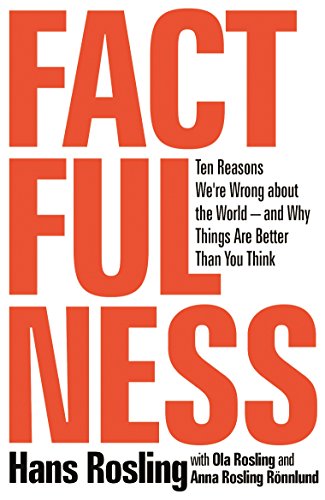
INSTANT NEW YORK TIMES BESTSELLER
“One of the most important books I’ve ever read—an indispensable guide to thinking clearly about the world.” – Bill Gates
“Hans Rosling tells the story of ‘the secret silent miracle of human progress’ as only he can. But Factfulness does much more than that. It also explains why progress is so often secret and silent and teaches readers how to see it clearly.” —Melinda Gates
Factfulness: The stress-reducing habit of only carrying opinions for which you have strong supporting facts.
When asked simple questions about global trends—what percentage of the world’s population live in poverty; why the world’s population is increasing; how many girls finish school—we systematically get the answers wrong. So wrong that a chimpanzee choosing answers at random will consistently outguess teachers, journalists, Nobel laureates, and investment bankers.
In Factfulness, Professor of International Health and global TED phenomenon Hans Rosling, together with his two long-time collaborators, Anna and Ola, offers a radical new explanation of why this happens. They reveal the ten instincts that distort our perspective—from our tendency to divide the world into two camps (usually some version of us and them) to the way we consume media (where fear rules) to how we perceive progress (believing that most things are getting worse).
Our problem is that we don’t know what we don’t know, and even our guesses are informed by unconscious and predictable biases.
It turns out that the world, for all its imperfections, is in a much better state than we might think. That doesn’t mean there aren’t real concerns. But when we worry about everything all the time instead of embracing a worldview based on facts, we can lose our ability to focus on the things that threaten us most.
Inspiring and revelatory, filled with lively anecdotes and moving stories, Factfulness is an urgent and essential book that will change the way you see the world and empower you to respond to the crises and opportunities of the future.
---
“This book is my last battle in my life-long mission to fight devastating ignorance…Previously I armed myself with huge data sets, eye-opening software, an energetic learning style and a Swedish bayonet for sword-swallowing. It wasn’t enough. But I hope this book will be.” Hans Rosling, February 2017.
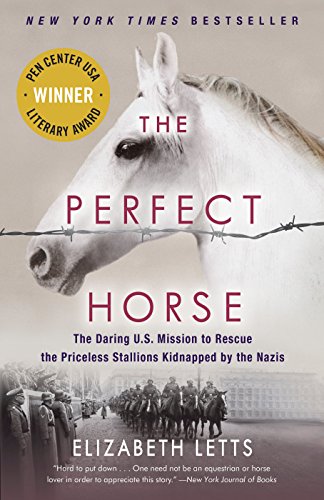
NEW YORK TIMES BESTSELLER • From the author of The Eighty-Dollar Champion, the remarkable story of the heroic rescue of priceless horses in the closing days of World War II
In the chaotic last days of the war, a small troop of battle-weary American soldiers captures a German spy and makes an astonishing find—his briefcase is empty but for photos of beautiful white horses that have been stolen and kept on a secret farm behind enemy lines. Hitler has stockpiled the world’s finest purebreds in order to breed the perfect military machine—an equine master race. But with the starving Russian army closing in, the animals are in imminent danger of being slaughtered for food.
With only hours to spare, one of the U.S. Army’s last great cavalrymen, Colonel Hank Reed, makes a bold decision—with General George Patton’s blessing—to mount a covert rescue operation. Racing against time, Reed’s small but determined force of soldiers, aided by several turncoat Germans, steals across enemy lines in a last-ditch effort to save the horses.
Pulling together this multistranded story, Elizabeth Letts introduces us to an unforgettable cast of characters: Alois Podhajsky, director of the famed Spanish Riding School of Vienna, a former Olympic medalist who is forced to flee the bomb-ravaged Austrian capital with his entire stable in tow; Gustav Rau, Hitler’s imperious chief of horse breeding, a proponent of eugenics who dreams of genetically engineering the perfect warhorse for Germany; and Tom Stewart, a senator’s son who makes a daring moonlight ride on a white stallion to secure the farm’s surrender.
A compelling account for animal lovers and World War II buffs alike, The Perfect Horse tells for the first time the full story of these events. Elizabeth Letts’s exhilarating tale of behind-enemy-lines adventure, courage, and sacrifice brings to life one of the most inspiring chapters in the annals of human valor.
Praise for The Perfect Horse
“Winningly readable . . . Letts captures both the personalities and the stakes of this daring mission with such a sharp ear for drama that the whole second half of the book reads like a WWII thriller dreamed up by Alan Furst or Len Deighton. . . . The right director could make a Hollywood classic out of this fairy tale.”—The Christian Science Monitor
“Letts, a lifelong equestrienne, eloquently brings together the many facets of this unlikely, poignant story underscoring the love and respect of man for horses.”—Kirkus Reviews
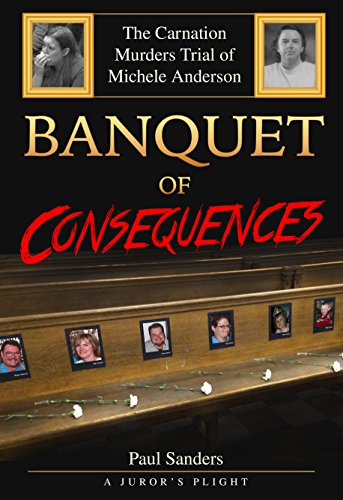
On Christmas Eve 2007, Judy and Wayne Anderson’s daughter, Michele, and her boyfriend, Joseph McEnroe, arrived at their home for a family meal.
Unbeknownst to them, their daughter was armed with a loaded 9 mm pistol and McEnroe was carrying a .357 Magnum. Both parents were callously shot dead by the pair and their bodies hidden from view.
Two and a half hours later, Michele’s brother Scott, his wife Erica and their two children, Olivia (5) and Nathan (3), arrived at the house. Within the hour, they too had been pitilessly slain, in an act of violence that was breath-taking in its scope and cruelty.
With his highly-anticipated third book, Paul Sanders takes the reader inside every day of the trial of Michele Anderson, with his customary attention to detail, from December 2015 until March 2016.
And in a unique digression from his other works, Sanders includes something he has never done before: An interview with one of the killers, Joseph McEnroe, at Walla Walla Penitentiary.
Banquet of Consequences is the first of two books on what came to be known as the Carnation murders. Were the killings a premeditated act, or had the defendants acted in self defense? And what of the deaths of Olivia and Nathan? Who shot them and why? It would not be an easy task for a jury to decide.
Paul’s book, Banquet of Consequences: A Juror’s Plight (Book 3 A Juror’s Perspective) has received many honors in the General Non-Fiction category: 2018 Winner Florida Book Festival, 2017 Winner Los Angeles – Halloween Book Festival, 2017 Runner-Up Southern California Book Festival Honors, 2017 Runner-Up London Book Festival Top Honors.
Look for Book Two: The Carnation Murders, “Beyond the Pale: Rogue Juror – The Joseph McEnroe Death Penalty Trial.”
Available 2020.
Reader reviews for Paul Sanders:
“Move over Ann Rule and Shanna Hogan and make way for America’s newest crime writer!”
“Paul Sanders is now among my favourite authors. Both of his books had me right there!”
“The reader is taken into a world few of us who have ever received a jury summons will ever experience.”

On June 4, 2008, at approximately 5:30 PM in a quiet suburb of Phoenix, Arizona, Jodi Arias stabbed Travis Alexander twenty-nine times, cut his throat and then shot him in the head. The killer then went to great lengths to cover up the crime, including sending his grandmother flowers, going to the memorial service, driving by the victim’s house and calling the lead investigator, Detective Esteban Flores.
It would take five years before the case would be put in front of a second jury and leave them to decide whether Arias was a cold, calculating killer or the victim of extreme domestic violence at the hands of an abusive boyfriend?
Paul Sanders sat in the public gallery for each and every one of the 47 days of the trial, and took extensive notes, transposing every twist and turn of it to social media every night. With allegations of pornography, racial slurs and a search for the answer to the question of domestic violence and alleged child abuse, the journey is both painful and meticulous.
Humbling, intimidating and powerful at the same time, this trial would test the jurors in ways they could never have foreseen, in their ultimate search for truth and justice.
On Pre-Sale Now! The stunning sequel to Paul Sanders first book, 'Brain Damage: A Juror's Tale':
'Secret Life of a Juror: Voir Dire - The Domestic Violence Query' (March 26, 2018)
Amazon Reviews:
“Having sat on this very jury, I can attest to the accuracy and attention to detail of “Why Not Kill Her.” Two thumbs up!” Haaken-Liknes, Jury Foreman of the Jodi Arias Death Penalty Retrial.
"Why Not Kill Her" is a gripping true crime story from the eyes of a former death penalty juror with a heart and soul that seeks truth and justice."
"Move over Ann Rule and Shanna Hogan and make way for America's newest true crime writer!"
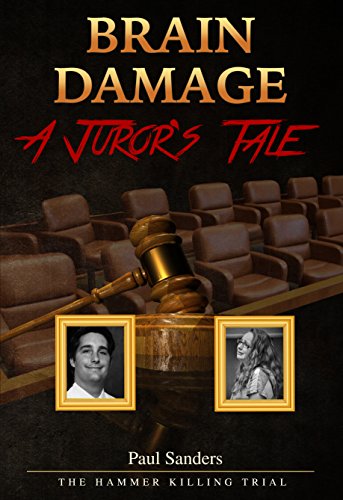
On January 14, 2009, Marissa DeVault killed her husband, Dale Harrell, by striking him multiple times on the head with a hammer. It seemed like a simple case of murder, but questions remained. Was Dale Harrell a hapless, innocent victim of a brutal killing, or was this the final act of a desperate woman who had suffered through years of domestic violence?
The fact that the incident took place in a middle class suburb of Phoenix, Arizona, with the couple’s three children within the property at the time, meant nothing.
The questions for the jury were simple. Was the killing premeditated or was it an act of self defense? Was it done for financial gain? Should the defendant pay for her crime with her life, should she be incarcerated for twenty-five years to life, or should she receive a life sentence with no chance of parole?
Author Paul Sanders was Juror #13 in a trial packed with twists and turns. He sat every day in court, in a trial which got deep inside the day-to-day lives of a family and eventually delivered justice to a victim.
Read this remarkable true story now and make up your own mind as to the truth behind the Hammer Killing Trial.
On Pre-Sale Now! The stunning sequel to 'Brain Damage: A Juror's Tale':
'Secret Life of a Juror: Voir Dire - The Domestic Violence Query' (Released March 26, 2018)
Amazon reviews:
“Mr. Sanders is a brilliant writer. You feel like you are right in the courtroom with him…”
“This is a must-read for any avid trial watcher!”
“Brain Damage is a very interesting journey through a death penalty trial. It made me want to be a juror!”
Also by Paul Sanders:
"Why Not Kill Her: A Juror's Perspective - The Jodi Arias Death Penalty Retrial"
"Banquet of Consequences: A Juror's Plight - The Carnation Murders Trial of Michele Anderson" (March 2017)

On January 23, 2014, the author reported for jury duty without taking notice to the media vehicles lined in front of the courthouse. He checked in unaware that 1200 others were also being counted as potential jurors. He did not know when he walked into the courtroom that the case of premeditated murder would change his life. It would seem that the most important question of the day, as asked to every potential juror, was whether he could, if the circumstances were correct and the law dictated as such, apply the death penalty to the defendant?
The most critical question, however, came during the written questioning process of voir dire, a tool for the court to determine whether a potential juror would be a final decision maker. The question was simple: had he ever experienced domestic violence as an adult or juvenile?
The answer would force the juror to face a past painted with child abuse and a future framed by shame. He had to confront the demons that would eventually impact his decision of whether the defendant should live or die.
Award winning author and former death penalty juror, Paul Sanders, does it again in his juror’s perspective series that began with the best-seller, ‘Brain Damage: A Juror’s Tale’, continued with ‘Why Not Kill Her: A Juror’s Perspective’ and riveted readers with ‘Banquet of Consequences: A Juror’s Plight’. ‘Secret Life of a Juror: Voir Dire’ is not as much about an infamous killer but about the sacrifices and truths a juror must confront before deciding the fate of another.
Amazon reviews of prior works:
“A treat to be inside the jury room…!”
“If the sign of a great writer is seen when you can’t put the story down…then Paul Sanders is a great writer!”
“Brain Damage is one of the best books ever written…kept me engaged!”

Stories from in-depth interviews with more than 100 family members from different ethnicities reveal the impact of the first-born daughter's role on her adult life, her siblings and family relationships. Commonly expressed: "I want to know I'm not the only one out there feeling this way." Results from the author's online survey of several hundred adult family members about their experiences and feelings provide additional insights into the pride and pain, resentments and hopes of oldest daughters and those who share their lives. At the end of each of the ten conversational-style chapters, a contributing clinical psychologist adds insights and self-help Reflections for personal transformation and restoring or improving sibling and family relationships. As this book illustrates, birth order is a fact; it does not have to be a fate. "Oldest Daughters: What to know if you are one or have ever been bossed around by one" affirms that changes are possible and can be transforming.

What could be better than travel highlights from the World’s Best Books written by the World’s Best Writers.
Twain in Paris, Dickens and Dumas at the Carnival in Rome, a bicycle trip from Teheran to Yokohama, Mary Seacole and Florence Nightingale first meeting in Crimea , Sir Arthur Conan Doyle in Ceylon and Rudyard Kipling interviewing Mark Twain.
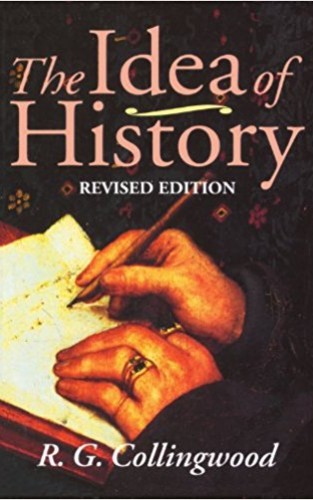
For many years before his death in 1943, R. G. Collingwood, who was both a Professor of Philosophy at Oxford and a practicing historian, was engaged in what he intended as a major contribution to the philosophy of history.
The Idea of History, first published in 1946, was this contribution. It became a canonical text, and linked the practise of philosophical thought with the job of the historian to place themselves in the minds of those men whose deeds he was placing into a context.
Four parts of the book describe how the modern idea of history has developed. Collingwood begins with the Greeks and Romans, writing of Livy, Tacitus, Herodotus and Thucydides, then progressing to the early modern period throughout Europe and focussing in turn on each of the main centres of historical thought: Italy, Germany, France and England.

Dr. P. J. Miller's story is unique. Growing up in New York City, who would have thought that he’d complete his veterinary degree at the Royal School of Veterinary Studies in Edinburgh, Scotland? In Cute Poodles, Sweet Old Ladies & Hugs, Dr. Miller has assembled a "greatest hits" of veterinary tales—stories that include colorful clients, wisecracking hospital staff, and pets that aren't always friendly.
Cute Poodles, Sweet Old Ladies & Hugs provides a humorous look at what Dr. Miller went through to become a veterinarian and his daily life as a doctor, told only as a typical New Yorker could. Underneath the humor, Dr. Miller gives a glimpse of how strong and emotional the human-animal bond can be, becoming an instant must-read for any aspiring veterinary professional or animal lover that wants to know what it is really like to be a veterinarian.
See his website for further information about the book and for more veterinary tales http://www.yodrmiller.com/

Hiroshima was one of the great tragedies of WWII.
But out of the devastation of the first atomic bomb, some survivors emerged - twenty-five courageous Japanese women who became part of a remarkable humanitarian epic.
Victims of the atomic blast that ushered in the Nuclear Age, these women were brought to the United States in 1955, where they underwent reconstructive surgery to repair the ravages of the bomb.
Schoolgirls when the bomb destroyed their futures, they began to remake their lives and re-create themselves.
This is the compassionate, often bittersweet chronicle of the Hiroshima Maidens.
It follows their lives from the terrifying moments of the detonation of the bomb, through their years as outcasts in their own country, to their not always idyllic stay in America, and on to their lives since — some tragic, some heroic, some affectingly ordinary.
“An illuminating portrait of heroic people...A sobering inspiration for all of us” — Philadelphia Inquirer
“Controlled, fearsome, wonderful, appalling.” — Los Angeles Times
“Evokes a range of human emotions that has been lost in the dead vocabulary of annihilation and deterrence” — The New York Times
Rodney Barker has been an editor, an investigative reporter, and a feature writer for a wide variety of regional and national magazines. In 1979 he was one of three American journalists awarded travel grants to Japan to write about Hiroshima; his resulting reportage, which was published in the Denver Post, reawakened his involvement with the Hiroshima Maidens, two of whom had stayed with his family when he was a child.
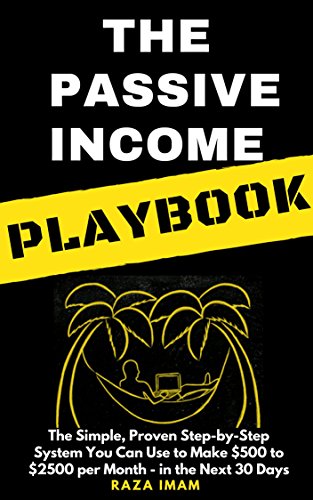
Are you looking for a a proven, step-by-step system that allows you to make passive income streams on autopilot - with very little experience?
Are you ready to start making passive income, but don't know where to begin?
Well, just imagine what it would be like if you easily saw money rolling into your bank account.
Because once you master this process, you'll be able to work from anywhere in the world.
You'll be able to quit your job for good.
And you'll be able to build passive income business profits over the long-term.
In this short but powerful book, I reveal my story of building a passive income business.
How I went from making 0 to almost $2000 per month - in a month.
And I've been making more and more money ever since.
You'll discover how I did it, step-by-step.
I'll show you how to get the same results as me.
Even if you have a full-time job.
In this book, you will learn:
It's time to stop gambling with your hard-earned money.
Join the thousands of smart professionals that are leveraging their expertise to make consistent passive income and make money from home.
I'm an Amazon best-selling author will show you exactly how I broke through fear, frustration, and self-doubt to make a consistent, passive income over the past 2 years (over $25,000).
I reveals the secrets I used to profitably grow my income and watch the money and sales roll into my bank account - like clockwork.
This strategy is powerful, and yet so simple to use.
Even if you are a complete beginner, this strategy will have you earning passive income streams in no time.
And if you ever get stuck, you can always reach out to me.
So get started today.